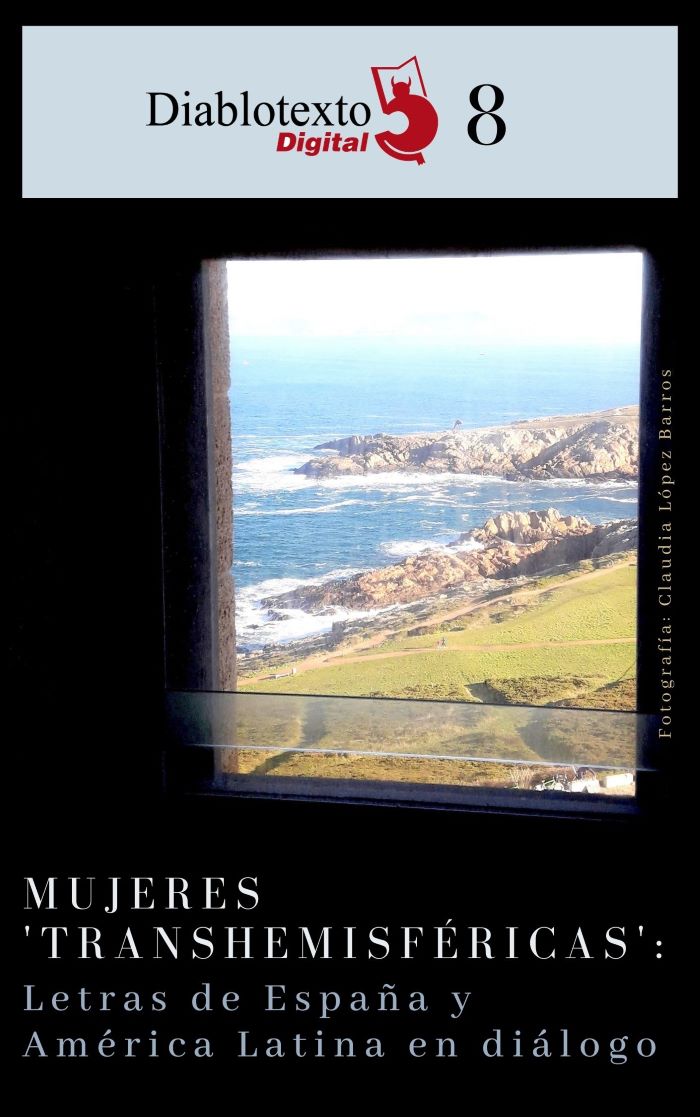Rosa Chacel: Subtle networks, marginality and exile
DOI:
https://doi.org/10.7203/diablotexto.8.18633Keywords:
Rosa Chacel, transhemispheric relations, republican exile, marginalities Abstract
Abstract
Within the Republican exile in America, Rosa Chacel built a self-image detached from the heroic representation that characterized the discourse of other exiled writers. First of all, we argue that her in a sense marginal position did not prevent it from tunning-in, during the 1940s and 1950s, with an Argentine narrative strand that privileged the uncanny and, furthermore, allow it to establish subtle networks with artists and leading writers of the Argentine cultural field during the first two decades of her exile in Rio de Janeiro and Buenos Aires (Norah Borges, Elvira Orphée and Silvina Ocampo). Secondly, we come to a stop and interpret the valuation of the exiled writer made by some young Spanish and Argentine writers during the 1970s and 1980s.
 Downloads
Downloads
 References
References
Bajtín, Mijaíl (1982). Estética de la creación verbal. México: Siglo XXI.
Balderston, Daniel (1983). “Los cuentos crueles de Silvina Ocampo y Juan Rodolfo Wilcock”, Revista Iberoamericana (octubre-diciembre), n.º 125, pp. 743-751.
Bocchino, Adriana (2006). “Exilio y desafío teórico: cuando la escritura hace lugar al autor”, Orbis Tertius, año XI, n.º 12. Disponible en <http://www.memoria.fahce.unlp.edu.ar/art_revistas/pr.217/pr.217.pdf> [Fecha de consulta: 12 de octubre de 2020].
Cabo Aseguinolaza, Fernando (2012). El lugar de la literatura española. Historia de la literatura española. Tomo 9. Dir.: José-Carlos Mainer. Barcelona: Crítica.
Cernuda, Luis (s.f.). “El tema”. En Fernando Cabo Aseguinolaza (2012). El lugar de la literatura española. Historia de la literatura española. Tomo 9. Barcelona: Crítica.
Chacel, Rosa (2014). “Un libro ciertamente nuevo”. Recuperado de Sur, (marzo-abril de 1957), n.º 245, pp. 111-117. En La lectura es secreto. Madrid: La linterna sorda.
Chacel, Rosa (2004). “Timoteo Pérez Rubio y sus retratos del jardín”. En Autobiografías. Dueñas: Fundación Jorge Guillén.
Chacel, Rosa (1998). Alcancía. Estación Termini. Salamanca: Junta de Castilla y León.
Chacel, Rosa (1983) “La confesión”, Revista SITIO, Buenos Aires, n.º 3, pp. 84-86.
Chacel, Rosa (1982). Alcancía. Ida. Barcelona: Seix Barral.
Chacel, Rosa; Moix, Ana María (1982). De mar a mar. Barcelona: Editorial Comba.
Gallego Cuiñas, Ana (2012). Entre la Argentina y España. El espacio transatlántico de la narrativa actual. Madrid/Frankfurt: Iberoamericana/Vervuert.
García Gual, Carlos (2006). “Cartas de consuelo al desterrado. Plutarco y Fray Antonio de Guevara. Imitación al contraste”. Alicante: Biblioteca Virtual Miguel de Cervantes, en <http://www.cervantesvirtual.com/obra/cartas-de-consuelo-al-desterrado-plutarco-y-fray-antonio-de-guevara-imitacin-al-contraste-0/> [Fecha de consulta: 16 de julio de 2020].
Giordano, Alberto (2015). “La tentación del diario: escritura de la intimidad y experiencia ética en La tentación del fracaso de Julio Ramón Ribeyro”, Cuadernos de literatura (enero-junio), Bogotá, vol. XIX, n.º 37, pp. 341-360.
Gracia, Jordi; Ródenas, Domingo (2011). Derrota y restitución de la modernidad. 1939-2010. Historia de la literatura española. Tomo 7. Dir.: José-Carlos Mainer. Barcelona: Crítica.
Hall, Stuart (2003). “Introducción. ¿Quién necesita identidad?”. En Stuart Hall y Paul du Gray (comp.). Cuestiones de identidad cultural. Buenos Aires: Amorrortu, pp.13-37.
Haroche-Bouzinac, Geneviève (2016). Escritas epistolares. São Paulo: Edusp.
Ianni, Octavio (1996). A era do globalismo. Rio de Janeiro: Civilização Brasileira.
King, John (1989). Sur. Estudio de la revista argentina y de su papel en el desarrollo de una cultura 1931-1970. México: Fondo de Cultura Económica.
Macciuci, Raquel (2006). Final de Plata Amargo. De la vanguardia al exilio: Ramón Gómez de la Serna, Francisco Ayala, Rafael Alberti. La Plata: Ediciones Al Margen.
Martínez, Erika (ed.) (2019). Señales mutuas. Estudios transatlánticos de literatura española y mexicana hoy. Madrid/Frankfurt: Iberoamericana/Vervuert.
Montaldo, Graciela (1999). Ficciones culturales y fábulas de la identidad en América Latina. Rosario (Argentina): Beatriz Viterbo.
Petrucci, Armando (2018). Escribir cartas, una historia milenaria. Buenos Aires: Ampersand.
Pezzoni, Enrique (1986). El texto y sus voces. Buenos Aires: Sudamericana.
Ramos, Julio (1989). Desencuentros de la modernidad en América Latina. Literatura y política en el siglo XIX. México: Fondo de Cultura Económica.
Revista SITIO (s/a, 1983). “Localización”. Buenos Aires, n.º 3, pp. 3-4.
Rodríguez Fischer, Ana (1992). Cartas a Rosa Chacel. Madrid: Cátedra.
Rotker, Susana (1992). Fundación de una escritura. Las crónicas de José Martí. La Habana: Casa de las Américas.
Soler Serrano, Joaquín (1976). Programa A fondo - Rosa Chacel. Entrevista a Rosa Chacel. Disponible en <https://youtu.be/q_PYDk4Imag> [Fecha de consulta: 10 de agosto de 2020].
Downloads
Published
How to Cite
-
Abstract555
-
PDF (Español)829
Issue
Section
License
Licencia de reconocimiento de Creative Commons “Reconocimiento - No Comercia l- Sin Obra Derivada
Authors who publish with this journal agree to the following items:
The authors will keep their copyright and guarantee the journal the right of first publication of their work, which will be simultaneously subject to the Creative Commons license that allows third parties to share the work indicating its author and its first publication in the journal. The authors may adopt other non-exclusive license agreements to distribute the version of the published work (e.g., depositing it in an institutional telematic file or publishing it in a monographic volume), with an acknowledgment of its initial publication in this journal. The authors are allowed and encouraged to disseminate their work through the Internet (e.g., in institutional telematic archives or on their website) before and during the submission process, which can produce interesting exchanges and increase citations of the published work. (See Effect of Open Access)




